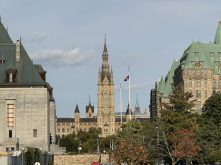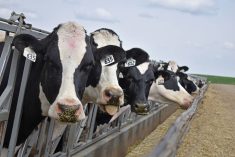Federal Minister of Agriculture Marie Claude Bibeau reaffirmed a pledge to compensate supply-managed industries for trade deals during a Nov. 26 committee appearance.
The federal government offered its first installment of a $1.75 billion payout to dairy producers to cover market losses from negotiations of two trade deals last year.
Bibeau said the federal government is “putting together the last details before we move to the second payment without further delay” and committed to making that payment before the end of March 2021.
Pressed by opposition numbers to provide the exact timing of the payment, or commit to making it before the end of 2020, Bibeau did not relent.
Read Also

Farming Smarter receives financial boost from Alberta government for potato research
Farming Smarter near Lethbridge got a boost to its research equipment, thanks to the Alberta government’s increase in funding for research associations.
“There is always hope, but our commitment is firm — we are going to make that second payment to dairy farmers this year, but you understand, if I could announce it now, it would have already been done,” she said.
Deputy Minister of Agriculture Chris Forbes said previous payments to the dairy industry were orchestrated through the Canadian Dairy Commission.
“It takes time to organize that,” he said. “Back then we had to put in a delivery system, we’re talking about electronic systems. So, you need the details from each producer, their quota, you need that data on hand.”
He added provincial dairy organizations were also involved, and that the process of ensuring producers are in a position to receive a payment also takes time.
“There are many different steps that need to be followed,” he said.
Bibeau echoed previous comments that the other supply-managed commodities will also be compensated, and told MPs details are coming soon for the poultry sector.
“We also committed to giving a clear answer to poultry producers,” she said in French, adding they will be informed “about the scope of compensation and the type of compensation” before April 2021.
Bibeau admitted a proposed law introduced by the Bloc Quebecois to legislate protections of supply-managed industries “needs to be studied carefully” but didn’t commit to supporting its passage.
The committee meeting touched on a number of other subjects, as well.
Bibeau said she is working with the Competition Bureau, an independent agency, to review the call for a Grocery Code of Conduct stemming from charges the major retailers are gouging producers and subjecting them to unfair penalties or fines.
“They have the knowledge and the expertise that they are willing to share with us,” she said, noting the topic was on the agenda for meetings with her provincial and territorial counterparts.
“Because it’s an important issue and we have to understand and respect the jurisdiction of the federal government and the provinces,” Bibeau said, adding she was looking forward to finding a roadmap of collaboration for the coming months, with the Code of Conduct being one option to follow.
Farmers have shown great resilience through a challenging year. Yesterday, at parliamentary committee, we examined the range of emergency programs our Government is rolling out to help them stay strong and drive our economy. #CdnAg pic.twitter.com/k0LeeDaoMg
— Marie-Claude Bibeau (@mclaudebibeau) November 27, 2020
Asked if she will advocate to exclude farmers from prices associated with the so-called carbon tax, Bibeau said it was something she is discussing with her colleagues in other departments.
Bibeau was non-committal on her stance towards neonics pesticides. Health Canada has said it will be ready by spring to announce if it plans to go ahead with decision to restrict the insecticide. The neonics, as they are commonly known, are applied to almost every corn and canola seed and a portion of soybean seeds. They are also sprayed on fruit, vegetables and berry crops.
Bibeau said she would follow the advice of Health Canada scientists.
The Minister also told MPs she had been working with her colleagues to ensure the safe and efficient arrival of temporary foreign workers to Canadian farms next year after the pandemic prevented the arrival of about 15 percent of those expected in 2020.
“Obviously, we are learning from this experience and doing everything to make sure that the arrival of the workers for the next season will go smoothly,” she said.


















